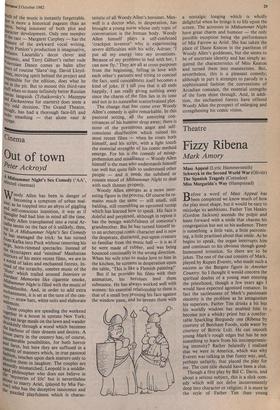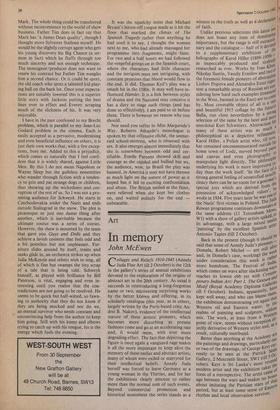Theatre
Fizzy Ribena
Mark Amory
Mass Appeal (Lyric Hammersmith) Schweyk in the Second World War (Olivier) The Spanish Tragedy (Cottesloe) Miss Margarida's Way (Hampstead) Before a word of Mass Appeal has been completed we know much of how the play must shape, but it would be easy to misjudge its ambitions. Father Tim Healey (Gordon Jackson) ascends the pulpit and leans forward with a smile that charms his congregation but not us his audience. There is something a little vain, a little patronis- ing, a little practised about that smile. As he begins to speak, the organ interrupts him and continues to his obvious though good- humoured irritation. So there are to be jokes. The rest of the cast consists of Mark, played by Rupert Everett, who made such a success as the Burgess figure in Another Country. So I thought it would concern the spiritual doubts of a young man entering the priesthood, though a few years ago I would have expected agonised romance. In fact the tactlessness of Mark's passionate sincerity is the problem as he antagonises his superiors. Father Tim drinks a bit but his worldly wisdom has enabled him to become not a whisky priest but a comfor- table Sparkling Burgundy one (Ribena by courtesy of Beecham Foods, soda water by courtesy of Britvic Ltd). He can smooth young Mark's rough edges but has he not something to learn from his uncompromis- ing intensity? Rather belatedly I realised that we were in America, which was why Everett was talking in that funny way, and, perhaps unfairly, that placed the play for me. The cute title should have been a clue.
Though a first play by Bill C. Davis, and about a serious subject, this is a slick com- edy which will not delve inconveniently deep into character or religion; it is more in the style of Father Tim than young Mark. The whole thing could be transferred without inconvenience to the world of show business. Father Tim does in fact say that Mark has 'a James Dean quality', though- I thought more Sylvester Stallone myself. He would be the slightly corrupt agent who gets his young discovery his Big Chance (a ser- mon in fact) which he fluffs through too much sincerity and not enough technique. The monsignor/producer does not want to renew his contract but Father Tim wangles him a second chance. Or it could be sport, the old coach who spots a talented kid play- ing ball on the back lot. Once your expecta- tions are suitably lowered this is a superior little story with Jackson putting the best lines over to effect and Everett scraping much of the slickness of his. It was very enjoyable.
I have in the past confessed to my Brecht problem, which is parallel to my Jean-Luc Godard problem in the cinema. Each is easily accepted as a pervasive, modernising and even beneficial influence on others, it is just their own works that, with a few excep- tions, bore me. Added to this a prejudice, which comes so naturally that I feel confi- dent that it is widely shared, against Little Men. By this I do not mean Napoleon or Wayne Sleep but the guileless nonentities who wander through fiction with a tenden- cy to grin and pat strange dogs or children, thus showing up the wickedness and cor- ruption of the rest of us. So I was not a pro- mising audience for Schweyk. He starts in Czechoslovakia under the Nazis and ends outside Stalingrad in the snow. The plot is picaresque or just one damn thing after another, which is inevitable because the ultimate source was a series of stories. However, the show is mounted by the team that gave you Guys and Dolls and they achieve a lavish cosiness that feels odd and a bit pointless but not unpleasant. Fur- niture slides around by itself, trains and tanks glide in, an orchestra strikes up when Julia McKenzie and others wish to sing, all of which is fine but swamps the tiny scrap of a tale that is being told. Schweyk himself, as played with brilliance by Bill Paterson, is vital, engaging and even in- teresting until you realise that the con- tradictions are not going to be resolved. He seems to be quick but half-witted, so fawn- ing to authority that they do not know if they are being mocked and nor do we, an eternal survivor who needs constant and unconvincing help from the author to keep him going. Still with his knees and elbows trying to catch up with his tongue, his is the energy which fuels the evening. It was the squelchy noise that Michael Bryant's bitten-off tongue made as it hit the floor that marked the climax of The Spanish Tragedy rather than anything he had used it to say. I thought the woman next to me, who had already massaged her programme into fragments, might faint. For two and a half hours we had followed the vengeful goings on at the Spanish court, where the characters had little character and the intrigues were not intriguing, with constant promises that blood would flow in the end. It did. Thomas Kyd's play was a smash hit in the 1580s. It may well have in- fluenced Hamlet. It is a link between styles of drama and the National may conceive it has a duty to stage such things (and has done so effectively). I am paid to sit before them. There is however no reason why you should.
Nor need you suffer in Miss Margarida's Way. Roberto Athayde's monologue is spoken by that offensive cliche, the unmar- ried school-mistress, who is obsessed with sex. It also emerges almost immediately that she is somewhere between odd and cer- tifiable. Estelle Parsons showed skill and courage as she cajoled and bullied but we, the audience, won. In Brazil the play was banned, in America it may not have thrown as much light on the nature of power as it hoped but it led to exciting confrontation and abuse. The British smiled at the floor, were relieved when she kept her clothes on, and waited politely for the end unbeatable.







































 Previous page
Previous page